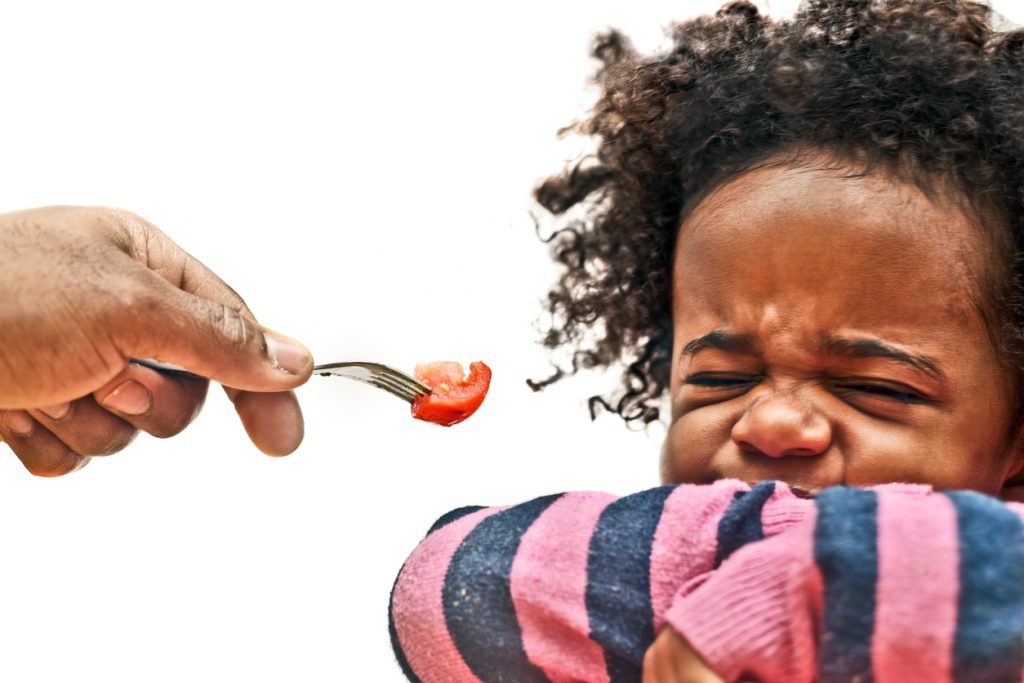Parenting is hard work. One of the most common challenges we face is teaching our kids to be healthy eaters. As obesity rates in children and adolescents rise, we’ve seen a large focus on the importance of teaching healthy eating with lots of “dos” and “don’ts.” Quite frankly it can be overwhelming.
In my psychology practice, I treat children and adolescents with feeding difficulties ranging from your typical picky eating to more extreme restrictive eating that leads to medical concerns.
I hear parents share their challenges, frustrations, and sometimes feelings of defeat. Parents come to me for help with feeding difficulties, and as a new mom embarking on my own journey of teaching my daughter to eat well, I never fathomed I would face some of these same challenges and frustrations. I figured I know how to shape a health eater, right? Well, what I forgot is that my 18-month old daughter is no different than any other kid!
My title at home is Mom, not Dr. Shelton, and I find myself veering from the very advice I provide every day to my patients and families. One of the most important we talk about, and what I must remind myself of, is what Ellyn Satter, a dietitian and feeding expert, coined as the division of responsibility in feeding – Parents are responsible for what is presented to eat and the manner in which it is presented. Kids are responsible for how much and even whether they eat. As a parent, this is sometimes a hard rule to follow because of our own parenting worries about our children’s growth and nutrition. However, this rule truly helps avoid unnecessary food battles with your toddler. Here are some other important mealtime strategies to keep in mind if you have a picky eater.
- Have scheduled meals and snacks. Typically we recommend 3 meals and 2-3 snacks throughout the day so your toddler has an opportunity to eat every 2 or 3 hours. Keeping a consistent daily schedule is important, too. Scheduled meals and snacks help avoid grazing throughout the day. You want your toddler to come to the table hungry and ready to eat. Otherwise, they won’t be motivated to eat much or try new foods.
- Plan ahead. You’re in charge of choosing the food for meals and snacks. Provide a variety of foods during the meal/snack so your toddler can pick and choose what she wants to eat.
- Don’t short-order cook. If you child refuses a meal or snack, don’t get up and make them something else. That gives your kiddo the message that they are not expected to eat what the family eats. It may seem like you’re wasting food if your toddler doesn’t eat very much, but in the long run you will teach you little one to eat what the rest of the family eats.
- Limit mealtimes to 20-30 minutes and snacks to 15 minutes. Keeping a kiddo at the table until they have finished their plate can lead to more food battles. Many parents worry that their kids will starve if they don’t eat their meal. But rest assured that your little one has 5-6 chances to each throughout the day. If they don’t eat much at one meal/snack, they’ll probably be hungrier for the next meal/ snack.
- Be realistic about portions. Toddlers don’t need to eat very much to meet their nutritional needs. If you’re worried about whether he’s eating enough, talk with your pediatrician.
- Expose, expose, expose. Toddlers can take a long time to warm up to new foods. If you don’t expose them to foods, they’ll never have the opportunity to warm up to it. Continuing to offer a new food leaves it as an option. One of those times, she might take you up on it! Consider it a success if she tastes the food but then takes it back out of her mouth. The more she does this, the more likely it is she might eat the food.
- Tolerate some mess. This is a hard one for parents, my husband included. Toddlers use their fingers and tend to be messy. Or if your toddler is like my daughter, she spends more time smashing her food between her fingers or tossing it around on her tray than actually eating. She tells us she does not like a food or is all done by dropping food on the floor. I have to remember that she is not trying to annoy us. She’s simply learning about her food and how to communicate with us. We have to teach our kids expectations for mealtime. It’s okay to set limits and say “no” to teach your kiddos to keep their food on their plate. Model other ways your kiddo can tell you she’s all done with mealtime. If they continue to misbehave, you can end mealtime.
- Don’t let your kiddo fill up on juice or milk. Many toddler love to drink juice and milk. If they fill up on those, they will be less interested in eating at meals because they’ve already gotten enough calories from their drinks. Limit juice and milk to meals/ snacks and offer water between meals/ snacks. Talk with your pediatrician about how much juice or milk to offer each day.
- Make mealtimes pleasant. Most importantly, take the focus off of eating. Meals are a time to spend with your family and to enjoy each other. Talk about your day, something fun ahead, anything! Leave electronics somewhere else and turn off the TV!






Comments